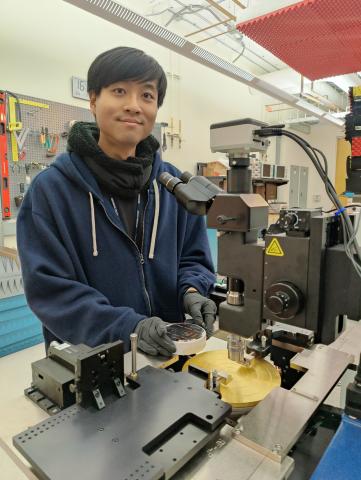The ECE Ph.D. candidate is working to develop a highly efficient on-chip antenna array to address growing global mobile video traffic.
Georgia Institute of Technology School of Electrical and Computer Engineering Ph.D. candidate Seung Yoon Lee has received an Institute of Electrical and Electronics Engineers (IEEE) Antenna and Propagation Society (AP-S) grant for the development of a highly efficient on-chip antenna array, in hopes of addressing growing global mobile video traffic.
The International Telecommunication Union (ITU) predicts global mobile video traffic will account for more than 75 percent of total mobile traffic by 2030 due to the rise in virtual reality, augmented reality, and high-fidelity mobile holograms.
Conventional low-efficient on-chip antenna arrays are unlikely to be able to efficiently transmit these next-generation data-intensive applications.
Lee’s project aims to design and create a 60 GHz electronically scanned array for high-speed wireless systems to help handle the potential huge increases in throughput.
He has conducted the research thus far in the mmWave Antennas and Arrays Laboratory under the supervision of ECE Assistant Professor Nima Ghalichechian.
The grant, which awards $5,000 to 10 Ph.D. candidates globally each year, aims to encourage careers in advanced electromagnetics, with selection based on the creativity and quality of proposed projects, along with discussions on the student's technical interests and skills.
Lee received his B.S. in computer and communication engineering from Korea University, and his M.S. in electrical engineering from the Pohang University of Science and Technology (POSTECH).
Prior to his time at Georgia Tech, he worked at Samsung Research and SK Hynix.
He’s published 4 peer-reviewed journal articles, 11 international conference papers, and is the inventor of 19 patents.
His research interests include mmWave on-chip antennas, phase-change material reconfigurable RF devices, and robotic antenna measurement techniques, which has won him a number of awards such as the 2023 CREATION Award from Georgia Tech and the 2018 Best Paper Student Award from the IEEE International Symposium on Antennas and Propagation.
